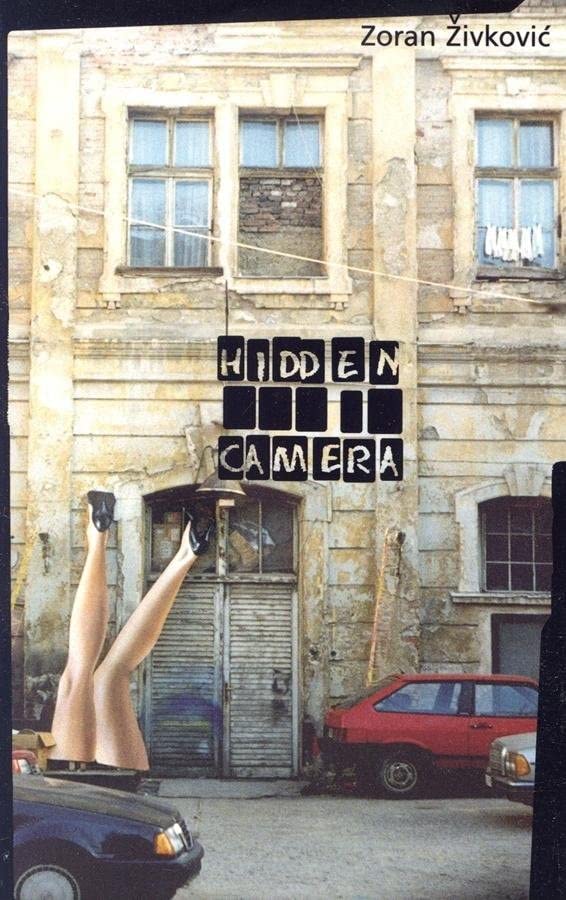ZORAN ZIVKOVIC WALKS THE PLANK

If you've been fortunate enough to be in communication with Zoran Zivkovic on a regular basis, you're also likely to have received mysterious little books in the mail, wrapped in light cardboard and held together with twine. For years, Zoran primarily published his books through his Polaris Press in Serbia-Montenegro, or through other European publishers. In recent years, though, through the Ministry of Whimsy (The Fourth Circle and his Library stories in Leviathan 3) and others, Zoran has made a bigger impact with an American audience.
Now, his new novel, Hidden Camera, has been published by the prestigious Dalkey Archive Press. It is getting reviewed in many high-profile publications. For anyone who has read Zoran's short stories, the formula for Hidden Camera may seem overly familiar: a nameless first person narrator navigates his way through an anonymous setting whilst encountering various people with whom the cipher communicates in various ways. At its best, this approach is luminous, mysterious, and riveting.
Hidden Camera is a novel that may divide a great many readers. For those who are not familiar with Zoran's short fiction, it may come as a revelation. For those of us who have read a lot of Zoran's short fiction, that element of surprise is no longer an option. The question, then, is whether the ideas in the novel support a reader's interest in it, and Hidden Camera has many, many ideas.
Publishers Weekly writes:
Zivkovic surveys the shifting line between paranoid fantasy and legitimate threat in his mystifying novel. When the unnamed narrator, an undertaker, is invited to a private film screening, he's surprised to see that the movie is one sustained shot of himself sitting on a park bench. With this episode, a complicated dance begins between the protagonist and his anonymous puppeteers, who manage to send him careening from one wild incident to the next. Directed to a used-book store, he discovers a novel supposedly written by him years in the future; obeying another mysterious invitation, he ventures to the zoo, where he has a close call in a bear cage, and things get worse from there. "Undertakers primarily favor gentle, sentimental films," he says indignantly, but there's nothing gentle about his adventures. Readers are propelled along as effectively as the narrator is, but they may be just as confused. As the story progresses, the undertaker's increasing paranoia makes it impossible to say how much of the danger is real and how much is imagined. After making a name for himself as a fantasy writer, Zivkovic has stepped intriguingly into experimental prose.
This is an interesting and useful book, and a prophetic place for new readers to start. Those who have read Zoran before will read in him again and again and again the same things in different proportions. He seems most interested in reliving certain combinations but with different details. The generic nature of the prose and the setting tests the reader at the greater length of a novel, but it is the kind of test we all need to take from time to time. And the publicity for Hidden Camera will help Zoran's career immeasurably.
Zoran's been kind enough to take time out from his very heavy PR schedule right now to walk the plank...
Jeff
ZORAN ZIVKOVIC WALKS THE PLANK

Why should readers pick up your books as opposed to, say, just about anybody else's books?
Because what I write is different.
Does your book have any socially redeeming qualities? If so, what are they?
My book primarily has literary and aesthetic qualities.
Does your book have any medicinal or mental health value to readers?
Medicinally, some of my books could be slightly useful if you suffer a mild case of tennis elbow or have water in your knees. It was also scientifically established that they can be disastrous for mental stability of readers with hidden philatelist inclinations.
Assume your book has been filed under "Ages 8 to 12" in the children's section, perhaps by mistake, perhaps not. How horrified do you imagine a child would be after reading your book, and why? How many years of therapy would the child take to recover from the experience?
My books are absolutely harmless for children as long as they don't read them. If they do, however, there is a high probability that they will become addicts.
If no one buys your book and you are unable to continue publishing your fiction due to the intense vilification that occurs in the media, what line of work will you go into?
I would become a man who unsuccessfully tries to commit suicide.



0 Comments:
Post a Comment
<< Home